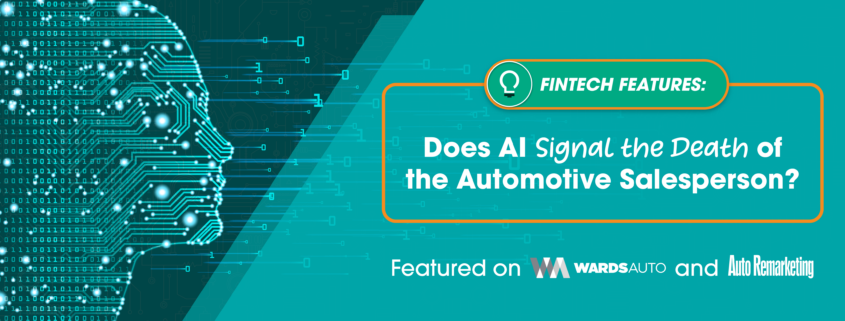Does AI Signal the Death of the Automotive Salesperson?
By Aaron Bickart, EVP & General Manager of OfferLogix
Douglas Adams, in The Salmon of Doubt,famously wrote, “Anything that happens before you’re born is normal; everything that happens between the ages of zero and 35 is revolutionary; anything that happens after that is against the natural order of things.” This sentiment may never have been truer as people today approach the rapid evolution of AI — often with deep skepticism. Is there reason to doubt? Where do most automotive salespeople fall in this shift? Will AI help or hinder them?
AI’s Role in Automotive Sales
The salesperson has always been at the core of the customer experience. Whether guiding first-time buyers through a maze of options or helping seasoned car enthusiasts find their next vehicle, salespeople have played an indispensable role in facilitating complex decisions.
But AI is already transforming many aspects of the industry. From AI-powered chatbots that engage potential buyers online to algorithms that predict future customer needs, the technology is automating various tasks that once required human attention. AI can analyze large datasets in real-time, identifying trends and patterns that help manufacturers and dealers optimize their inventory, marketing, and sales strategies. It can handle repetitive tasks such as sending follow-up emails, processing basic credit applications, and even providing personalized car recommendations based on a customer’s online behavior.
These efficiencies improve the customer experience by speeding up the sales cycle. For instance, timely follow-up is critical to closing deals, but many salespeople struggle with the sheer volume of leads and the logistics of communications. Enter AI:
- Automated Follow-Up Scheduling: AI can schedule and send follow-up messages based on customer interactions, ensuring that no opportunity is missed.
- Personalized Communication: By analyzing customer data, AI can craft personalized messages that resonate with individual preferences and past interactions.
- Predictive Analytics: AI can determine the optimal time for follow-ups based on historical data and customer behavior, increasing the likelihood of a positive response.
- Lead Scoring and Prioritization: AI can prioritize leads based on their potential to convert, allowing salespeople to focus on the most promising prospects.
- Enhanced CRM Integration: AI provides real-time updates and insights, ensuring that salespeople have relevant data during follow-up interactions.
- Sentiment Analysis: AI can gauge customer emotions by analyzing their responses, enabling salespeople to adjust their approach as needed.
- Automated Response Handling: Chatbots and virtual assistants can handle simple inquiries, qualifying leads and freeing up salespeople for more complex tasks.
These advancements ultimately enhance sales performance and customer satisfaction. By automating routine tasks, AI allows salespeople to focus on what they do best: relationship-building, problem-solving, and closing deals.
AI and Voice Calls: A New Frontier for Sales
While many sales interactions are moving online, voice calls remain a key touchpoint for automotive salespeople. AI-powered voice assistants and analytics tools can enhance the effectiveness of these calls. For example, AI can transcribe conversations, highlight key moments, and provide real-time coaching to help salespeople improve their communication strategies. Additionally, AI can use sentiment analysis to understand the customer’s tone and mood, offering insights on when to push forward with a sale or when to take a step back.
Voice AI technology can also help in generating leads, managing schedules, and even handling some follow-up calls—leaving more time for the human salesperson to focus on building rapport and trust, areas where AI cannot yet fully compete.
Is AI the Death of the Automotive Salesperson?
The truth is, while AI is automating many parts of the sales process, it is unlikely to replace the salesperson altogether. Sales are still deeply human. The ability to understand a customer’s emotional journey, to read body language, and to develop trust is something that AI, despite its advanced capabilities, cannot yet replicate.
Instead, AI will likely serve as a powerful tool that enables salespeople to be more effective. By automating time-consuming tasks, AI allows salespeople to focus on high-value interactions—understanding customer needs, offering personalized advice, and guiding buyers through more complex decisions like financing or trade-ins. And the data-driven insights provided by AI can empower sales teams to be more strategic.
Douglas Adams’ observation on technological change may ring true, but the fear that AI will replace the human salesperson is likely misplaced. Ultimately, the future of automotive sales is not about AI versus humans. It’s about combining the strengths of both—allowing machines to handle the data-driven, repetitive tasks while humans do what they do best: build relationships and close deals. In this collaborative future, AI will help the sales profession evolve, not eliminate it.
And that means more penny perfect payments.







